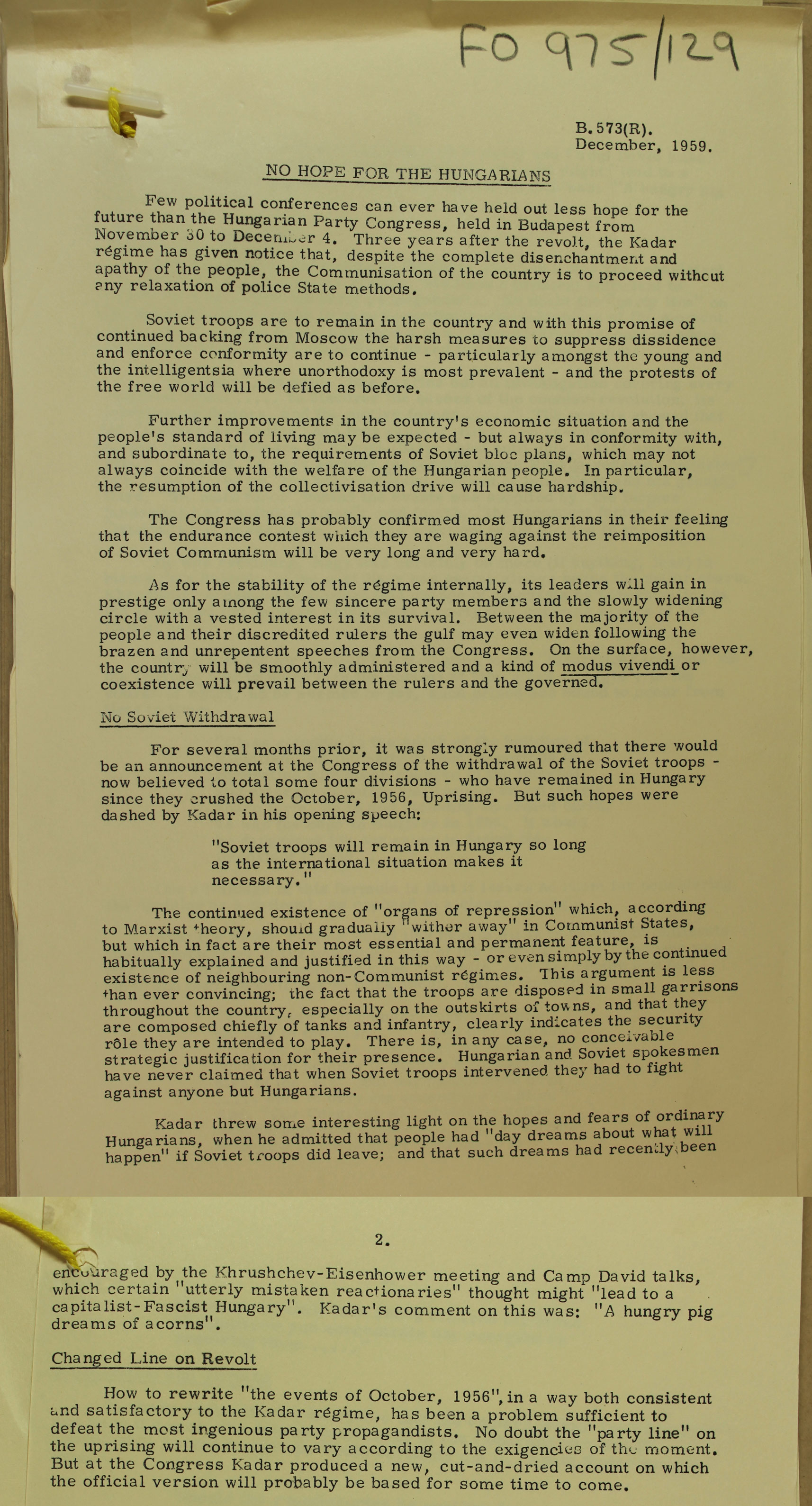
Extracts from a Foreign Office report on the state of Hungary 1959, (Catalogue ref: FO 975/129)
Transcript
B.573(R).
December, 1959.
NO HOPE FOR THE HUNGARIANS
Few political conferences can ever have held out less hope for the future than the Hungarian Party Congress, held in Budapest from November 30 to December 4. Three years after the revolt, the Kadar regime has given notice that, despite the complete disenchantment and apathy of the people, the Communisation of the country is to proceed without any relaxation of police State methods.
Soviet troops are to remain in the country and with this promise of continued backing from Moscow the harsh measures to supress dissidence and enforce conformity are to continue-particularly amongst the young and the intelligentsia where unorthodoxy is most prevalent- and the protests of the free world will be defied as before.
Further improvements in the country’s economic situation and the people’s standard of living may be expected-but always in conformity with and subordinate to, the requirements of Soviet bloc plans, which may not always coincide with the welfare of the Hungarian people. In particular, the resumption of the collectivisation drive will cause hardship.
The Congress has probably confirmed most Hungarians in their feeling that the endurance contest which they are waging against the re-imposition of Soviet Communism will be very long and very hard.
As for the stability of the regime internally, its leaders will gain in prestige only among the few sincere party members and the slowly widening circle with a vested interest in its survival. Between the majority of the people and their discredited rulers the gulf may even widen following the brazen and unrepentant speeches from the Congress. On the surface, however, the country will smoothly administered and a kind of modus vivendi [way of life] or co-existence will prevail between the rulers and the governed.
No Soviet Withdrawal
For several months prior, it was strongly rumoured that there would be an announcement at the Congress of the withdrawal of the Soviet troops- now believed to total some four divisions- who have remained in Hungary since they crushed the October, 1956, Uprising. But such hopes were dashed by Kadar in his opening speech:
“Soviet troops will remain in Hungary so long as the international situation makes it necessary”
The continued existence of “organs of repression” which, according to Marxist theory, should gradually “wither away” in Communist States, but which in fact are the most essential and permanent feature, is habitually explained and justified in this way- or even simply by the continued existence of neighbouring non-communist regimes. This argument is less than ever convincing; the fact that the troops are disposed in small garrisons throughout the country, especially on the outskirts of towns that they are composed chiefly of tanks and infantry, clearly indicates the security role they are intended to play. There is, in any case, no conceivable strategic justification for their presence. Hungarian and Soviet spokesmen have never claimed that when Soviet troops intervened they had to fight against anyone but Hungarians.
Kadar threw some interesting light on the hopes and fears of ordinary Hungarians, when he admitted that people had “day dreams about what will happen” if Soviet troops did leave; and that such dreams had recently been encouraged by the Khrushchev-Eisenhower meeting and Camp David talks which “utterly mistaken reactionaries” thought might “lead to a capitalist-Fascist Hungary”. Kadar’s comment on this was: “A hungry pig dreams of acorns”.
Changed Line on Revolution
How to rewrite the “events of October, 1956”, in a way both consistent and satisfactory to the Kadar regime, has been a problem sufficient to defeat the most ingenious party propagandists. No doubt the “party line” on the uprising will continue to vary according to the exigencies of the moment. But at the Congress Kadar produced a new, cut-and-dried account on which the official version will probably be based for some time to come.
